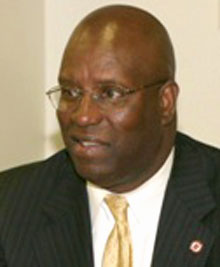"Those two questions are very fair," Williams concedes. "We have this one high-profile opportunity to change the public perception of Boston, and we have worked very hard to get it right."
A DOWNTOWN EVENT
The ULEM's conference Web site provides a hint of why people have been worried. As of mid-July, the only events or activities listed were either the few official conference events — all in or near the Boston Convention and Exhibition Center — or standard Boston-waterfront recommendations, like the Aquarium and USS Constitution.
"Right now, it's purely a downtown event," one City Hall insider lamented earlier this month.
Not that black visitors to Boston need to spend time in "Black Boston." But, the thinking goes, if they remain isolated in and around the convention center, attendees won't see the mixture of races and ethnicities now thriving in happy coexistence — at least, in comparison with 20 or 30 years ago.
The conference will try to showcase Boston's diversity, even at waterfront events. The welcome reception on Wednesday will feature foods representing neighborhoods — pasta for the North End, Caribbean for Dorchester/Mattapan, lobster for Beacon Hill, and so on — amid displays replicating the Strand Theater façade, Chinatown arch, and other landmarks.
And, Williams says, a special send-off reception is in the works, to be hosted by South Boston elected officials — Irish-Americans like State Senator Jack Hart, City Councilor Bill Linehan, and State Representative Nick Collins, who lived through the busing wars. That could be an important gesture. (Massachusetts Convention Center Authority James Rooney, who is playing a critical role in the planning, is also a Southie native.)
But none of that will change the fact that when conference attendees stroll around the convention center and nearby venues, they won't see many black faces — which, as Settles notes, remains a stark contrast to conventions held in other big cities like Washington, Chicago, or Atlanta.
So, even though it's not necessarily the national Urban League's top priority, city leaders want to get these visitors away from the waterfront. That's why, earlier this month, Menino demanded a meeting with local and national Urban League leaders to hash out the plans for the event. Menino has had Marie St. Fleur, his chief of advocacy and strategic investment, working with ULEM for six months; recently he asked his former director of arts and tourism, Julie Burns, to also get involved. Burns, now a vice-president at Blue Cross Blue Shield of Massachusetts, was Menino's top organizer for the 2004 Democratic National Convention in Boston.
Menino has also arranged to sponsor a trolley tour for attendees, focusing on the city's diversity. Just this week, plans were still being finalized for a Menino-hosted welcome reception at Hibernian Hall in Roxbury's Dudley Square. And Menino arranged for an exhibit of Haitian art, made by earthquake victims, to be on display at the Hynes Convention Center in the Back Bay — although the exhibit was supposed to return to Haiti several weeks ago.
The Patrick administration has also stepped up its involvement, led by assistant secretary Ron Marlow from the administration and finance department.
STROKE OF LUCK

DARNELL WILLIAMS Will the Urban League leader be “ready for prime time” by next week’s conference? |
Others — including public-relations guru Collette Phillips and community activist Ron Bell — are planning their own events, not unlike the independent activities held around town during the 2004 Democratic Convention, many of which outshone the official offerings.